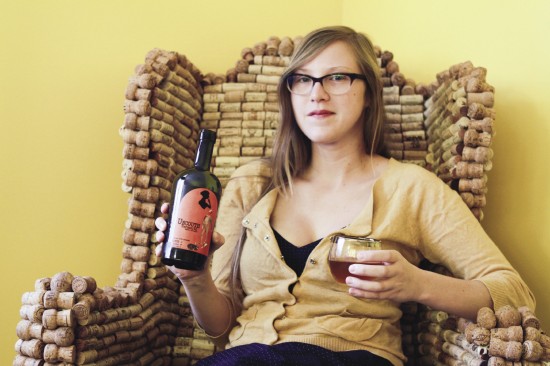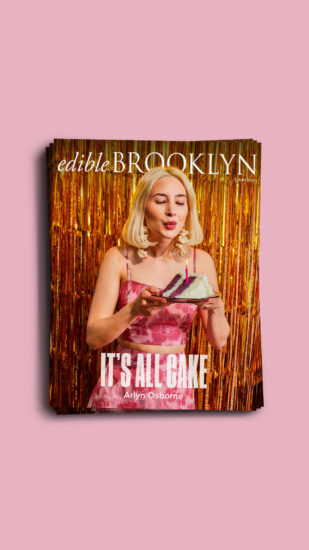
How can something so delicate and nuanced bear such a revolting image?
Uncouth Vermouth may be the most thoughtful of the recent New World vermouths to hit the market. The wine base is sourced from sustainable wineries and infused with locally foraged herbs. Yet its logo—a dissonant record screech—is a prim Jane Austen silhouette with an indecorous finger thrust up its nose.
“That’s disgusting,” I say candidly.
Uncouth founder Bianca Miraglia, 28, is gleeful: “That’s just the reaction I was going for!”
From behind the bar at Sweetwolf’s in Park Slope, where she works, Miraglia pulls several bottles of vermouth from the refrigerator, ranging in color from cloudy pale yellow to amber to vibrant rosy pink, and I promptly forget the unsavory logo.
Her voyage to vermouth began a decade ago, bartending at The Inn at Thorn Hill, a New Hampshire restaurant famed for its 4,000-bottle wine cellar. Tastings were part of the job and Miraglia fell hard for Oregon Pinot Noir. Impulsively, she packed up and drove cross-country to Oregon’s Willamette Valley.
“I knew no one out there,” Miraglia recalls, but in the years that followed she worked at various Oregon wineries, “doing any job I could get.”
In 2009 Miraglia returned to the East Coast, settling in Brooklyn.
“I was having trouble finding vermouth that I was in love with,” she explains. “I just decided to make my own.” Her experimental infusions soon made “housemade vermouth” cameos in the restaurant’s cocktails.
As martini and Manhattan lovers know, vermouth is essentially wine fortified with a distilled spirit and flavored with aromatics. But as a wine lover, Miraglia laments that the wine used is often of inferior quality.
“I decided that starting with quality wine was 100% the only way to make a delicious vermouth,” she declares.
Her first bottlings, released in October, featured wine from Red Hook Winery, but Superstorm Sandy threw a mighty wrench in Uncouth’s plans when it destroyed that facility. She’ll source from other sustainable wineries until the Brooklyn vintner rebuilds, but “long term, my relationship will be with Red Hook Winery, absolutely,” she vows.
The fine wine in her debut bottling clearly makes a difference, particularly in Uncouth’s sweet vermouths. Made from a “funky” sour Riesling, the result is complex and intriguing. Her dry vermouths are made from a light, almost citrusy blend of Pinot Blanc, Chardonnay and Viognier.
The wine isn’t the only local ingredient. The grappa too is distilled from local vineyard “waste,” and the bittering agents were harvested at SustainAbility Farm on Long Island (“I filled the entire backseat of my car with mugwort”), with additional herbs sourced from Blue Hill Stone Barns in Pocantico Hills, NY.
Miraglia plans to release three limited-edition bottlings each quarter, saying seasonal vermouths honor the freshness of the wine. A sweet vermouth with Serrano and lavender is among the maiden bottlings; a second might feature pumpkin or pear.
A certain amount of planned obsolescence factors in; already she foresees what won’t be back until summer, such as blackberry-infused vermouths.
This teasing “once it’s gone, it’s gone” vintage approach is necessary in the wine world—but will it fly with spirits, where consistency is king? If this unconventional approach succeeds, may I suggest a logo revision? Update that silhouette to Jane Austen thumbing her nose.



